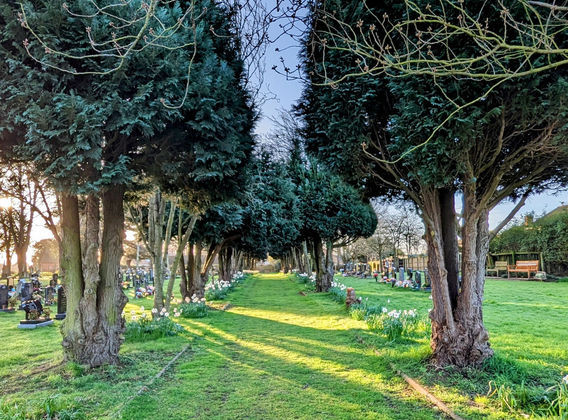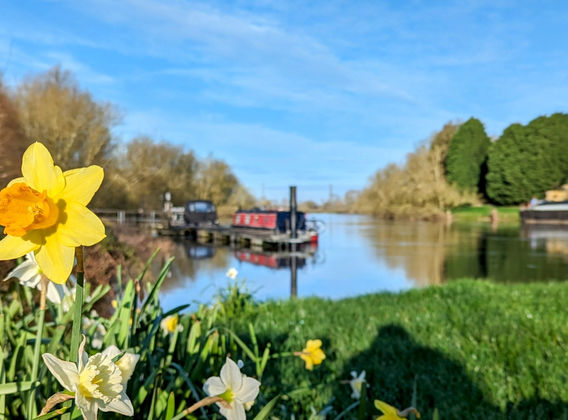Farndon
A Scenic Riverside Village
Farndon is a picturesque village just a short walk from Newark-on-Trent, making it an ideal destination for a leisurely loop along the river. The walk offers stunning views and the chance to spot a bevy of swans, often numbering in the dozens. Farndon is also a great location for wild swimming, kayaking, and stand-up paddleboarding (SUP). With four pubs, including two riverside establishments and one on a boat, it provides a perfect midway stop for refreshments during your walk.
Historical Significance
Farndon boasts a rich history, with some sources indicating that its name means "Fern Hill." It is thought to be the site or near the site of the Roman fort Ad Pontem, meaning "the place by the bridges"
-
Medieval Mentions: Farndon is regularly mentioned in medieval sources under various names. The Domesday Book refers to the village as Farendune and describes it as an 'outlier' along with the neighboring village of Balderton, both of which belonged to the Bishop of Lincoln. Although Farndon is not specifically mentioned as possessing a church, the Domesday Book states that the Newark wapentake had ten churches, which have not been individually identified. Farndon may have been one of these, especially given its surviving 11th-century fabric
-
English Civil War: The village played a small part in the English Civil War. During the Siege of Newark in 1646, Farndon was occupied by a Parliamentarian regiment led by Sydnam Poyntz. In the same year, partially due to Poyntz inviting local people to dismantle Newark's Royalist defenses and slight the castle, a plague that had previously been contained in the town ended up killing an estimated 25% of Farndon's population
-
19th Century: In the 19th century, farming, malting, willow growing, and basket making were the main sources of employment for men and women. The village also had a blacksmith, butcher, baker, general store, and cobbler
Farndon Ferry
Until recent years, there used to be a ferry across the Trent from Farndon to Rolleston. In August 1948, 12-year-old Ronnie Ward of Northgate, Newark, was bestowed the title of "Little Hero of Farndon" after rescuing a child from the River Devon by the Farndon Ferry. Ronnie's modesty meant his parents only learned of the rescue from eyewitnesses
Farndon Fields Palaeolithic Site
During site investigations for the A46 road improvements, a significant Late Upper Palaeolithic archaeological site was identified and later excavated at Farndon Fields. The site contained a flint scatter, a spread of waste flakes produced by flint knapping to create sharp-edged tools. Dated using Optically Stimulated Luminescence, the archaeology was confirmed to date back some 13,000 years, making it a rare open field site[1]. Archaeologist Phil Harding described the finds as "the dream scenario," imagining the hunters using new flint tools to process animal carcasses at this seasonal camp
Ad Pontem
Ad Pontem was a small 1st-century military garrison that later became a larger defended town. The name appears to refer to a bridge over the adjacent River Trent, although no trace of a bridge has been found. The site includes a first-century fortlet or road-post and a nearby kite-shaped enclosure with a military-style turf wall. In the second century, a town developed on the site of the fortlet with earthwork defenses, later rebuilt in stone in the 3rd century. Roman occupation extends from the 1st century to the mid/late 4th century AD
St. Peter's Church
The present building of St. Peter's Church is partially the result of construction work during the reign of Elizabeth I in 1598, but a building has stood on this site since at least the 12th century. Historians debate whether the church is Anglo-Saxon in origin or later. The round-headed north doorway, with its crude voussoirs and long-and-short quoins, is Saxo-Norman in style and dates from the 11th century, indicating that there has been a church on this site since at least the 11th century
A Walk Through History
Farndon is a delightful village to explore, offering a blend of historical intrigue and natural beauty. Whether you're interested in its rich past, scenic walks, or riverside activities, Farndon has something for everyone. The village's 19 listed buildings add to its charm, making it a must-visit destination near Newark-on-Trent.











